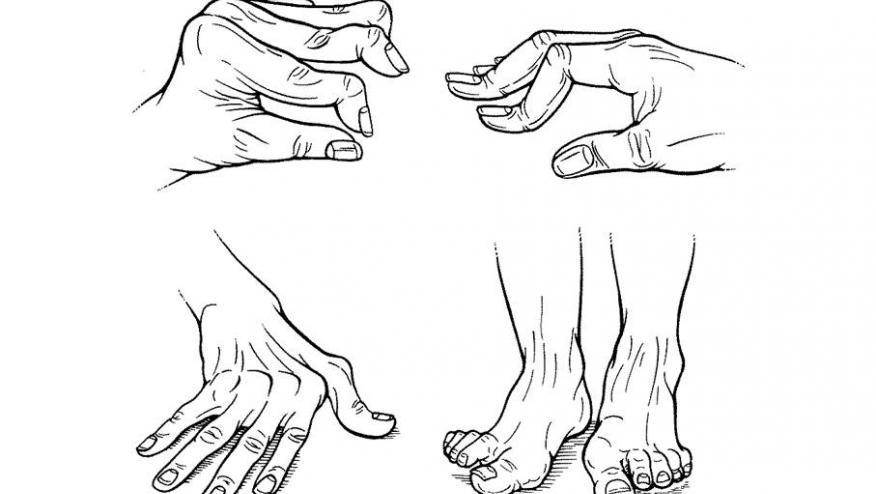Baricitinib Benefits Refractory RA Save

The small molecule oral JAK inhibitor baricitinib was effective for patients with highly refractory rheumatoid arthritis, a phase III study found.
In a cohort of 527 patients with rheumatoid arthritis, a 20% response according to the criteria of the American College of Rheumatology (ACR20) was seen in 55% of patients receiving 4 mg/day of baricitinib plus conventional background therapies compared with 27% of those given placebo (P0.001), according to Mark C. Genovese, MD, of Stanford University in Palo Alto, Calif., and colleagues.
Among that cohort, 42% had previously received one biologic agent, 30% had been given two, 27% had already tried three biologics, and in 38%, at least one of the biologics used was not a tumor necrosis factor (TNF) inhibitor, the researchers reported in the March 31 issue of New England Journal of Medicine.
"Our findings have particular relevance because of the unmet need for effective treatment of rheumatoid arthritis in patients receiving a conventional synthetic [disease-modifying anti-rheumatic drug] DMARD with inadequate disease control despite previous treatment with multiple biologic agents; the number of such patients has been consistently increasing since biologic DMARDs first became available more than 15 years ago," Genovese and colleagues wrote.
Baricitinib is an inhibitor of the Janus kinases (JAK) 1 and 2 that was effective in phase II trials among patients who had not responded sufficiently to conventional DMARDs.
To determine if the drug's efficacy extended to large numbers of patients with disease refractory to biologic therapies, the investigators conducted a study at 178 centers in 24 countries, enrolling patients from January 2013 to March 2014.
Participants were randomized to receive 2 mg or 4 mg baricitinib daily, or placebo, plus conventional therapies including DMARDs, nonsteroidal anti-inflammatory drugs, and 10 mg prednisone or less per day.
Their mean age was 56, average disease duration was 14 years, and 80% were women. They had moderately to severely active disease, with baseline swollen and tender joint counts of 17 and 29, respectively. Mean high-sensitivity C-reactive protein levels were 20 mg/L (a level of 3 mg/L is considered the upper limit of normal).
Genovese also presented some data from this study at the 2015 annual meeting of the European League Against Rheumatism. In that presentation, he reported that ACR50 and ACR70 responses were seen at 3 months in 28% and 11% of the 4-mg group compared with 8% and 2% of the placebo group, and that many patients began to show improvement in the first week of treatment.
Patients receiving the 4-mg dose of baricitinib also had significantly greater improvements on efficacy measures other than ACR20, including the disease activity score in 28 joints at weeks 12 and 24 (P0.001 for both time points) and for the Health Assessment Questionnaire Disability Index (P0.001 for both time points).
On an additional measure, remission according to the Simplified Disease Activity Index, nonsignificant differences were seen at week 12, but by week 24, a total of 9% of patients in the 4-mg group were in remission compared with 2% of the placebo group (P0.01).
During the 24 weeks, 4% of patients in the placebo and 2-mg baricitinib groups withdrew from the trial because of an adverse event, as did 6% of those in the 4-mg group.
Serious adverse events were reported by 7%, 4%, and 10% of the three groups, respectively, and serious infections were reported in 3%, 2%, and 3%. One patient in the 4-mg group, a 76-year-old patient with diabetes, died following a basilar artery thrombosis, and a second had a nonfatal myocardial infarction.
There were two cases of nonmelanoma skin cancer in the 4-mg group, but no cases of gastrointestinal perforation.
Laboratory test abnormalities included increases in low-density lipoprotein cholesterol and small, transient increases in serum creatinine with baricitinib treatment. There also were reductions in neutrophil counts, but there were no treatment withdrawals because of these changes.
"In comparison with previous phase III trials of treatments for rheumatoid arthritis, this study enrolled a high proportion of patients (more than one third) with an inadequate response to or unacceptable side effects associated with both TNF-inhibitor and non-TNF-inhibitor biologic DMARDs," Genovese and colleagues wrote.
Among those previous trials was one testing tofacitinib (Xeljanz), the first-in-class JAK inhibitor for rheumatoid arthritis, which otherwise went unmentioned in the NEJM report.
Limitations of the study included its short duration and a lack of radiographic data. "Additional studies are needed to assess long-term safety and durability of response," the investigators concluded.
The study was sponsored by Eli Lilly. Several of the co-authors reported financial relationships, including employment, with Eli Lilly, and also with other companies including Pfizer, Vertex, AbbVie, Novartis, Bristol-Myers Squibb, and UCB.
This article is brought to RheumNow by our friends at MedPage Today. It was originally published on March 31, 2016.










If you are a health practitioner, you may Login/Register to comment.
Due to the nature of these comment forums, only health practitioners are allowed to comment at this time.